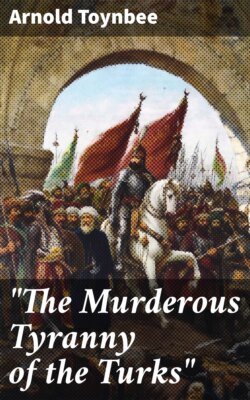Читать книгу "The Murderous Tyranny of the Turks" - Arnold Toynbee - Страница 5
На сайте Литреса книга снята с продажи.
The Subject Peoples of Turkey.
ОглавлениеTable of Contents
Who are the peoples in Turkey whom the Allies are determined to liberate? The Ottoman Empire contains somewhat more than 20,000,000 inhabitants, and of these only about 8,000,000—less than 40 per cent. of the whole—are Turks.[1] There are 7,000,000 Arabs; there are 2,000,000 Armenians (or, rather, there were, before the atrocities of 1915); the Greeks, too, number little short of 2,000,000, and there are probably the same number of non-Turkish mountaineers—Kurds, Nestorians, Druses, Maronites and so on. The non-Turkish peoples thus amount to more than 60 per cent. of the population of Turkey. They were all of them settled in the country before the Turks arrived—the Turks conquered Asia Minor about the time the Normans conquered England, while several of the conquered races have lived there from time immemorial—and all these races have been at their lowest ebb since and so long as they have been under Turkish Government.
The Greeks were leaders of civilisation in the Ancient World and in the Middle Ages, till the Greek Empire of Constantinople was conquered by the Turks in 1453. From that moment they dropped out till the War of Liberation, a century ago, restored part of the Greek nation to independence. The Greeks who have remained under Turkish government have also remained cut off from Greek national life.
The Armenians were the first people to make Christianity their national religion. They are an intellectual people, clever and industrious in practical affairs and in the life of the spirit. When they possessed an independent kingdom they produced a fine literature and architecture, which Turkish conquest destroyed. Since then the Turks have repressed all symptoms of Armenian revival by massacres, the most terrible of which was perpetrated last year.
The Arabs created a wonderful civilisation at the time when Medieval Europe was in its darkest age. Their discoveries in mathematics, astronomy, chemistry, medicine, are the foundations of modern science, as is witnessed by the Arabic words in our scientific vocabulary. This Arabic civilisation was swamped by the Turkish migrations from Central Asia in the 11th century, and blotted out by the Mongols, who followed in the wake of the Turks and sacked Baghdad, the Arab capital, in the 13th century. The Arabs are still the most progressive race in the Islamic world; they are almost as numerous as the Turks in the population of the Ottoman Empire, and they are not divided from the Turks by difference of religion. Yet the Turkish government excludes them from all share of control, and has thwarted their revival as persistently as it has thwarted that of the Armenians and Greeks. They too have been massacred and exiled during the present War.
The Kurds, also, were there before the Turks, but they have not the same tradition as the other three races behind them. In their case the Turks have not destroyed an existing civilisation, but have prevented them acquiring civilisation when they showed inclination to do so. The Kurd has been a lawless mountain shepherd for many centuries, but he becomes a hard-working, peaceable cultivator when he comes down into the plains. The Turkish government deliberately checked this tendency, which began to show itself in the Kurds about half a century ago, by serving out arms to them and licensing them to harry their Armenian neighbours.
